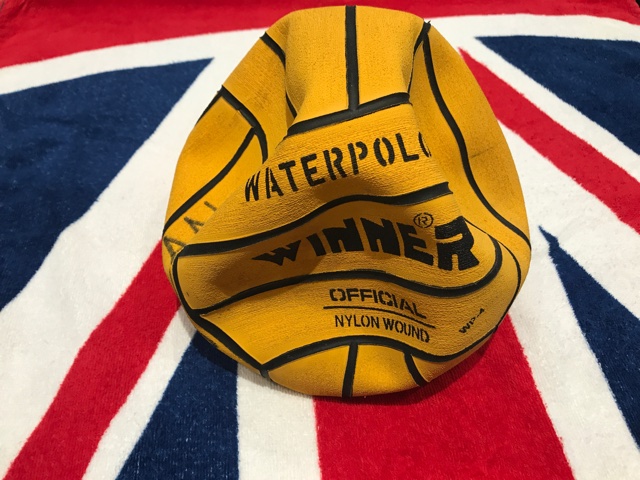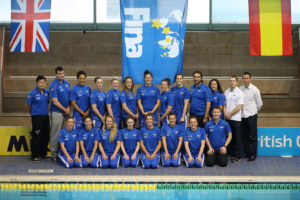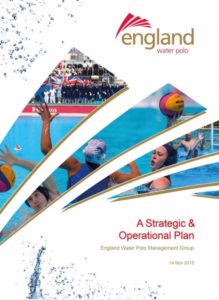Latest News
The Water Polo Management Group 5 years on, and how Swim England has failed water polo - October 11, 2019

 In April 2014, Great Britain women’s water polo team celebrated in Manchester after defeating world champions Spain 9-7 (1-0, 3-1, 3-4, 2-2) in the FINA World League. It was a euphoric moment, and with qualification for a second successive European Championships already secured for the summer, it appeared the squad were on the verge of a bright future. But the players and coaches knew dark clouds were forming and just a few months later the Great Britain senior water polo programme ceased to exist.
In April 2014, Great Britain women’s water polo team celebrated in Manchester after defeating world champions Spain 9-7 (1-0, 3-1, 3-4, 2-2) in the FINA World League. It was a euphoric moment, and with qualification for a second successive European Championships already secured for the summer, it appeared the squad were on the verge of a bright future. But the players and coaches knew dark clouds were forming and just a few months later the Great Britain senior water polo programme ceased to exist.
The writing had been on the wall since February 2014 when UK Sport announced funding for the Olympic discipline was being cut from £4.5million to zero. “We’ve been through so much over the last three or four months. It’s been horrific,” Great Britain’s Angie Winstanley-Smith told the BBC after the victory over Spain. “You can see how we celebrated, that was like a final for us.”
Despite showing great potential, the 2014 European Championships proved to be their final tournament together and afterwards the players were forced to go their separate ways and the lights went out.
British Swimming’s Chief Executive at the time David Sparkes told the BBC the cuts were, “an extremely dark day for women’s sport in this country” and said the announcement “could well signal the death of these historic Olympic sports in Britain”.
He wasn’t wrong and five years later, the slow rebuilding process of our senior international programme continues to prove extremely difficult, with numerous setbacks hindering even the slightest progress.
In 2014 Swim England (then ASA) reacted to the funding cuts by commissioning the Tunnicliffe Review, which examined in detail how the sport could progress in this country. The Tunnicliffe review proposals included the following:
New water polo leadership, governance and a management structure with clear powers & responsibilities
Consolidation of existing finance / resource within a “water polo budget”
A focus on an ENG senior programme in the interim in the absence of GBR senior polo
Unification of the sport domestically under the brand “England Water Polo”
Swim England accepted the proposals in early 2015, when Chris Bostock, then Chair of the ASA Sport Governing Board, stated, “The ASA has shown commitment to the discipline of water polo by the commissioning of this review and will now ensure appropriate resources are available to formulate a realistic and achievable plan which leads to a sustainable programme from grassroots to performance.”
 In Jan 2015, Jane Nickerson, the current CEO of Swim England, announced Ian Elliot as Chair of a new Water Polo Management Group which was to use the recommendations set out in the review document as a framework for a revised strategic and operational plan for the next two to three years, with an outline plan for ten years. Further volunteers were then to be appointed to the Management Group charged with driving the sport forward, and Swim England promised to support the national teams’ international ambitions.
In Jan 2015, Jane Nickerson, the current CEO of Swim England, announced Ian Elliot as Chair of a new Water Polo Management Group which was to use the recommendations set out in the review document as a framework for a revised strategic and operational plan for the next two to three years, with an outline plan for ten years. Further volunteers were then to be appointed to the Management Group charged with driving the sport forward, and Swim England promised to support the national teams’ international ambitions.
Swim England commented on the importance “to maintain a relevant and appropriate international programme, both for the future of the sport globally and to ensure there is a complete pathway for athletes.”
British Swimming Chair Maurice Watkins added, “Building the international side of the Game is vitally important and British Swimming will work with the three Home Countries to establish a high performance culture with strong leadership and support.”
They were powerful words and gave the community confidence that the Governing Bodies were ready to work closely alongside the new Management Group and help fulfil their international ambitions.
But more than four years of turmoil have followed, with the British senior men’s and women’s water polo teams still absent from LEN or FINA events, and of the original members of the Management Group, now only Ian Elliot remains…
Ian as Chair of the Group, was originally joined in 2015 by Simon Tinkler, Phil Winstanley, Chris Dean, Mike Jukes, Sarah Dunsbee and Mike Hesketh, with Mark Ray and Eamonn O’Rourke appointed to the team at a later date.
After the Group’s formation in early 2015, the sport’s rebuilding process began immediately and in a presentation to the community in Nov 2015 they stated, “the ambition of British water polo must be to qualify for, and compete at, European Championships, and Swim England needs to support a strategy culminating in English and British (senior) athletes competing in European competition by 2019.”
The Group added, “It is essential Swim England (and British Swimming) continue to support this aspiration as it is essential that experiences at this level, whether good or bad, will contribute to the longer term success.”
 In accordance with Swim England’s original instructions, the Management Group produced its 80 page Strategic and Operational Plan for England Water Polo which it presented to both the water polo community and Swim England in Nov 2015.
In accordance with Swim England’s original instructions, the Management Group produced its 80 page Strategic and Operational Plan for England Water Polo which it presented to both the water polo community and Swim England in Nov 2015.
In its Plan the Management Group recommended that the appropriate governance structure to achieve the stated objectives for water polo was for the Water Polo Management Group to be given appropriate powers and delegated authority by the ASA to govern the sport, with proper accountability to the ASA.
The hopes of the community were raised, but Swim England failed to respond to the Plan, and after 4 months of silence from Swim England, several key members of the Group resigned, claiming the views of the Management Group differed wildly from the Governing Bodies’, and it appeared the initial promises made by Swim England and British Swimming had been forgotten.
Chris Dean and Simon Tinkler were the first to leave in March 2016, and released a joint statement declaring their comprehensive plans for Marketing and Communications and Governance respectively had been totally ignored.
The Performance Pathway Lead, Phil Winstanley, was the next high-profile departure in October 2018, following numerous disagreements with Swim England and British Swimming over funding.
Mark Ray, who took over the Marketing and Communications role for the Group experienced similar frustrations before also quitting the Group, as did Mike Jukes, Mike Hesketh and Jo Mountfield.
In a report compiled by the Water Polo Management Group in September 2018, it stated, “The lack of any available current strategy or objectives from British Swimming for water polo only further reinforces the severity of the challenge we all face.
“The programme needs £100,000 p.a. to match the current budget and achieve stand-still. Any sports talent system needs to have aspirational opportunities to compete at senior international level and the current funding does not allow this.”
In mid-September 2019, Swim England announced its new annual budget for water polo would be £80,000, making the prospect of our senior national teams entering LEN or FINA events in the near future looking even bleaker.
 Sarah Dunsbee and Eamonn O’Rourke were the next to announce their resignations from the Management Group, leaving Ian Elliot isolated and in an extremely difficult position with the Governing Bodies.
Sarah Dunsbee and Eamonn O’Rourke were the next to announce their resignations from the Management Group, leaving Ian Elliot isolated and in an extremely difficult position with the Governing Bodies.
Sarah was heartbroken to leave her position after several years of hard work supporting Swim England and British Swimming, but felt she had no choice, stating, “I can no longer see how I can continue trying to break down barriers between us.
“Any recommendations we put forward are undermined by the office staff who make final decisions. I feel I can no longer support any of their decisions going forward and therefore this makes my involvement with them untenable.
What now?
Despite the lack of support from the Governing Bodies, the Water Polo Management Group has made real progress over the last 5 years in several areas of our sport, including the establishment of a long term Strategic Partnership with Manchester City Council, the hosting, in partnership with Manchester City Council, of several high quality international events, including LEN Junior European qualifiers, and the reappearance, for the first time in many years, of teams in the World University Games in Taipei in 2017 and Naples in 2019.
However there is a real sense that as the Water Polo Management Group disintegrates, all the gains of the past 5 years are being lost, and there is a developing vacuum of leadership at the top of our sport. The talent is there, the officials, coaches and players are ready to play, but they lack NGB leadership, support and backing.
We sincerely hope that the Governing Bodies understand that the water polo community sees them as toxic, that they recognise the mistakes which they have made, and realise that a new way of working together must be found to heal the sport and lead this country’s senior water polo back to the international stage where it belongs.
4 responses to “The Water Polo Management Group 5 years on, and how Swim England has failed water polo”
Leave a Reply Cancel reply
This site uses Akismet to reduce spam. Learn how your comment data is processed.

Latest News
The Water Polo Management Group 5 years on, and how Swim England has failed water polo -

 In April 2014, Great Britain women’s water polo team celebrated in Manchester after defeating world champions Spain 9-7 (1-0, 3-1, 3-4, 2-2) in the FINA World League. It was a euphoric moment, and with qualification for a second successive European Championships already secured for the summer, it appeared the squad were on the verge of a bright future. But the players and coaches knew dark clouds were forming and just a few months later the Great Britain senior water polo programme ceased to exist.
In April 2014, Great Britain women’s water polo team celebrated in Manchester after defeating world champions Spain 9-7 (1-0, 3-1, 3-4, 2-2) in the FINA World League. It was a euphoric moment, and with qualification for a second successive European Championships already secured for the summer, it appeared the squad were on the verge of a bright future. But the players and coaches knew dark clouds were forming and just a few months later the Great Britain senior water polo programme ceased to exist.
The writing had been on the wall since February 2014 when UK Sport announced funding for the Olympic discipline was being cut from £4.5million to zero. “We’ve been through so much over the last three or four months. It’s been horrific,” Great Britain’s Angie Winstanley-Smith told the BBC after the victory over Spain. “You can see how we celebrated, that was like a final for us.”
Despite showing great potential, the 2014 European Championships proved to be their final tournament together and afterwards the players were forced to go their separate ways and the lights went out.
British Swimming’s Chief Executive at the time David Sparkes told the BBC the cuts were, “an extremely dark day for women’s sport in this country” and said the announcement “could well signal the death of these historic Olympic sports in Britain”.
He wasn’t wrong and five years later, the slow rebuilding process of our senior international programme continues to prove extremely difficult, with numerous setbacks hindering even the slightest progress.
In 2014 Swim England (then ASA) reacted to the funding cuts by commissioning the Tunnicliffe Review, which examined in detail how the sport could progress in this country. The Tunnicliffe review proposals included the following:
New water polo leadership, governance and a management structure with clear powers & responsibilities
Consolidation of existing finance / resource within a “water polo budget”
A focus on an ENG senior programme in the interim in the absence of GBR senior polo
Unification of the sport domestically under the brand “England Water Polo”
Swim England accepted the proposals in early 2015, when Chris Bostock, then Chair of the ASA Sport Governing Board, stated, “The ASA has shown commitment to the discipline of water polo by the commissioning of this review and will now ensure appropriate resources are available to formulate a realistic and achievable plan which leads to a sustainable programme from grassroots to performance.”
 In Jan 2015, Jane Nickerson, the current CEO of Swim England, announced Ian Elliot as Chair of a new Water Polo Management Group which was to use the recommendations set out in the review document as a framework for a revised strategic and operational plan for the next two to three years, with an outline plan for ten years. Further volunteers were then to be appointed to the Management Group charged with driving the sport forward, and Swim England promised to support the national teams’ international ambitions.
In Jan 2015, Jane Nickerson, the current CEO of Swim England, announced Ian Elliot as Chair of a new Water Polo Management Group which was to use the recommendations set out in the review document as a framework for a revised strategic and operational plan for the next two to three years, with an outline plan for ten years. Further volunteers were then to be appointed to the Management Group charged with driving the sport forward, and Swim England promised to support the national teams’ international ambitions.
Swim England commented on the importance “to maintain a relevant and appropriate international programme, both for the future of the sport globally and to ensure there is a complete pathway for athletes.”
British Swimming Chair Maurice Watkins added, “Building the international side of the Game is vitally important and British Swimming will work with the three Home Countries to establish a high performance culture with strong leadership and support.”
They were powerful words and gave the community confidence that the Governing Bodies were ready to work closely alongside the new Management Group and help fulfil their international ambitions.
But more than four years of turmoil have followed, with the British senior men’s and women’s water polo teams still absent from LEN or FINA events, and of the original members of the Management Group, now only Ian Elliot remains…
Ian as Chair of the Group, was originally joined in 2015 by Simon Tinkler, Phil Winstanley, Chris Dean, Mike Jukes, Sarah Dunsbee and Mike Hesketh, with Mark Ray and Eamonn O’Rourke appointed to the team at a later date.
After the Group’s formation in early 2015, the sport’s rebuilding process began immediately and in a presentation to the community in Nov 2015 they stated, “the ambition of British water polo must be to qualify for, and compete at, European Championships, and Swim England needs to support a strategy culminating in English and British (senior) athletes competing in European competition by 2019.”
The Group added, “It is essential Swim England (and British Swimming) continue to support this aspiration as it is essential that experiences at this level, whether good or bad, will contribute to the longer term success.”
 In accordance with Swim England’s original instructions, the Management Group produced its 80 page Strategic and Operational Plan for England Water Polo which it presented to both the water polo community and Swim England in Nov 2015.
In accordance with Swim England’s original instructions, the Management Group produced its 80 page Strategic and Operational Plan for England Water Polo which it presented to both the water polo community and Swim England in Nov 2015.
In its Plan the Management Group recommended that the appropriate governance structure to achieve the stated objectives for water polo was for the Water Polo Management Group to be given appropriate powers and delegated authority by the ASA to govern the sport, with proper accountability to the ASA.
The hopes of the community were raised, but Swim England failed to respond to the Plan, and after 4 months of silence from Swim England, several key members of the Group resigned, claiming the views of the Management Group differed wildly from the Governing Bodies’, and it appeared the initial promises made by Swim England and British Swimming had been forgotten.
Chris Dean and Simon Tinkler were the first to leave in March 2016, and released a joint statement declaring their comprehensive plans for Marketing and Communications and Governance respectively had been totally ignored.
The Performance Pathway Lead, Phil Winstanley, was the next high-profile departure in October 2018, following numerous disagreements with Swim England and British Swimming over funding.
Mark Ray, who took over the Marketing and Communications role for the Group experienced similar frustrations before also quitting the Group, as did Mike Jukes, Mike Hesketh and Jo Mountfield.
In a report compiled by the Water Polo Management Group in September 2018, it stated, “The lack of any available current strategy or objectives from British Swimming for water polo only further reinforces the severity of the challenge we all face.
“The programme needs £100,000 p.a. to match the current budget and achieve stand-still. Any sports talent system needs to have aspirational opportunities to compete at senior international level and the current funding does not allow this.”
In mid-September 2019, Swim England announced its new annual budget for water polo would be £80,000, making the prospect of our senior national teams entering LEN or FINA events in the near future looking even bleaker.
 Sarah Dunsbee and Eamonn O’Rourke were the next to announce their resignations from the Management Group, leaving Ian Elliot isolated and in an extremely difficult position with the Governing Bodies.
Sarah Dunsbee and Eamonn O’Rourke were the next to announce their resignations from the Management Group, leaving Ian Elliot isolated and in an extremely difficult position with the Governing Bodies.
Sarah was heartbroken to leave her position after several years of hard work supporting Swim England and British Swimming, but felt she had no choice, stating, “I can no longer see how I can continue trying to break down barriers between us.
“Any recommendations we put forward are undermined by the office staff who make final decisions. I feel I can no longer support any of their decisions going forward and therefore this makes my involvement with them untenable.
What now?
Despite the lack of support from the Governing Bodies, the Water Polo Management Group has made real progress over the last 5 years in several areas of our sport, including the establishment of a long term Strategic Partnership with Manchester City Council, the hosting, in partnership with Manchester City Council, of several high quality international events, including LEN Junior European qualifiers, and the reappearance, for the first time in many years, of teams in the World University Games in Taipei in 2017 and Naples in 2019.
However there is a real sense that as the Water Polo Management Group disintegrates, all the gains of the past 5 years are being lost, and there is a developing vacuum of leadership at the top of our sport. The talent is there, the officials, coaches and players are ready to play, but they lack NGB leadership, support and backing.
We sincerely hope that the Governing Bodies understand that the water polo community sees them as toxic, that they recognise the mistakes which they have made, and realise that a new way of working together must be found to heal the sport and lead this country’s senior water polo back to the international stage where it belongs.
4 responses to “The Water Polo Management Group 5 years on, and how Swim England has failed water polo”
-
Barry Hurst says:
As I said water polo needs to break away as a separate body from Swim England, British Swimming and the ASA
-
Margaret Middleton says:
This is Such a Shame! The commitment from all involved has been tremendous from all involved. The team have given their all & had brilliant results They deserve at least as good results in funding. Come on Sport England reward these dedicated people
-
Christine Whittaker says:
Swim England were quick enough to respond to the American Football issue. I look forward to reading their response to this summary of the last five years of their oversight of water polo.
-
Neal Greenslade says:
SwimEngland and British Swimming – how can any Governing body read recent articles with some very serious comments – including some of BULLYING and totally ignore it!
I have a copy of your Strategy and WavePower as it appears you lost yours.
Water Polo itself accepts second best – no stats, no metrics, no testing, no fitness etc etc but then again these basics of Water Polo should be coming from our Governing SwimEngland Water Polo ‘staff’ – American Football is based on these factors!
The odd 400m test even an academy level isn’t what Water Polo teams do to become fit for international Water Polo! Gives us Guidance on how to become a top international team again or are you not employed to do that?
Communicate with us and sort out the recent accusations.
Why not appoint an accountable overall head coach who can take us into the 21st Century (other teams don’t employ the fitness and tactics they do because they are worse than us!) deploy non negotiable independent fitness testing that must be achieved by all players (showing commitment and not relying on favouritism to be selected) and have independent selection panels!
Parents spend a lot of money for their children to have the chance to play internationally – please start taking your roll seriously YOU are letting down young people who start their Water Polo journey full of hope and end it more often than not disillusioned!
To remind you what SwimEngland’s Strategy says ‘our strategy will be delivered by living our values and working together as one swimming family’ and ‘We will also be measuring satisfaction levels across a range of areas, including training and resources to ensure our members, volunteers and workforce are fully supported’ please do!
Stop letting people down including yourselves
Leave a Reply Cancel reply
This site uses Akismet to reduce spam. Learn how your comment data is processed.


As I said water polo needs to break away as a separate body from Swim England, British Swimming and the ASA
This is Such a Shame! The commitment from all involved has been tremendous from all involved. The team have given their all & had brilliant results They deserve at least as good results in funding. Come on Sport England reward these dedicated people
Swim England were quick enough to respond to the American Football issue. I look forward to reading their response to this summary of the last five years of their oversight of water polo.
SwimEngland and British Swimming – how can any Governing body read recent articles with some very serious comments – including some of BULLYING and totally ignore it!
I have a copy of your Strategy and WavePower as it appears you lost yours.
Water Polo itself accepts second best – no stats, no metrics, no testing, no fitness etc etc but then again these basics of Water Polo should be coming from our Governing SwimEngland Water Polo ‘staff’ – American Football is based on these factors!
The odd 400m test even an academy level isn’t what Water Polo teams do to become fit for international Water Polo! Gives us Guidance on how to become a top international team again or are you not employed to do that?
Communicate with us and sort out the recent accusations.
Why not appoint an accountable overall head coach who can take us into the 21st Century (other teams don’t employ the fitness and tactics they do because they are worse than us!) deploy non negotiable independent fitness testing that must be achieved by all players (showing commitment and not relying on favouritism to be selected) and have independent selection panels!
Parents spend a lot of money for their children to have the chance to play internationally – please start taking your roll seriously YOU are letting down young people who start their Water Polo journey full of hope and end it more often than not disillusioned!
To remind you what SwimEngland’s Strategy says ‘our strategy will be delivered by living our values and working together as one swimming family’ and ‘We will also be measuring satisfaction levels across a range of areas, including training and resources to ensure our members, volunteers and workforce are fully supported’ please do!
Stop letting people down including yourselves